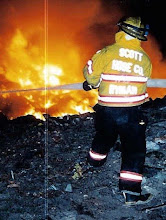It’s
not sexy and certainly not as “fun” as live fire evolutions, firefighter
survival, or even the bread and butter practice of advancing lines or throwing
ladders. What it is, though, is critical
for the “business” of the fire service.
The
importance of lifelong learning cannot be over emphasized. The next generation of fire service leaders
will be confronted with a spectrum of problems only some of which we can imagine. Others will reveal themselves over time. Managing the “all hazards” response agency
that fire departments have become in a continuing era of increasing demands and
highly pressured financial resources will need a new problem solving
paradigm. This won’t come about by
simply repeating what we’ve done in the past, as good as it may have been. It will require a new generation of strategic
multi-dimensional thinkers. The military
has understood this for decades, sending officers for advanced degrees in a
multitude of disciplines at “civilian” universities.
I’ve
argued before, college level classes, particularly in the humanities, won’t
teach you to handle a nozzle better, but if you let them, they will teach you
to think, to examine and solve problems differently. Problem solving, with the challenges of the
future, will be a skill of paramount importance.
A
thought process which looks at problems from a historical perspective, from one
of engineering and mathematics, business and statistics, and puts all these
pieces together, will help bring new and innovative solutions to the
forefront. The catch phrase “thinking
outside the box” is easy to say, but much harder to do. Non fire related classes teach some of these
alternative problem solving methods, how to look at issues from other
directions and perspectives—essentially a new and different way to think.
The
next generation of leaders will need not only to be great firefighters and
command officers; they will need to be outstanding writers, politicians,
accountants, business managers, and strategic planners.




No comments:
Post a Comment